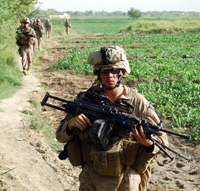pressroom Past FilmsObama's War
Season Premiere Tuesday, October 13, 2009, at 9 P.M. ET on PBS (check local listings) Tens of thousands of fresh American troops are now on the move in Afghanistan, led by a new commander, and armed with a counter-insurgency plan that builds on the lessons of Iraq. But can U.S. forces succeed in a land long known as the "graveyard of empires?" FRONTLINE producers Martin Smith ("Beyond Baghdad," "Return of the Taliban") and Marcela Gaviria ("In Search of Al Qaeda") once again make the dangerous journey to the frontlines of America's biggest fight. Through interviews with the top U.S. commanders on the ground, embeds with U.S. forces, and fresh reporting from Washington, Smith and Gaviria examine U.S. counter-insurgency strategy in Afghanistan and Pakistan--a fight that promises to be longer and more costly than most Americans understand. Press Release FRONTLINE EXAMINES U.S. COUNTERINSURGENCY STRATEGY IN AFGHANISTAN AND PAKISTAN FRONTLINE Season Premiere www.pbs.org/frontline/obamaswar Tens of thousands of fresh American troops are now on the move in Afghanistan, led by a new commander and armed with a counterinsurgency plan that builds on the lessons of Iraq. But can U.S. forces succeed in a land long known as the "graveyard of empires"? And can the U.S. stop the Taliban in neighboring Pakistan, where U.S. troops are not allowed and the government is weak? In FRONTLINE's season premiere, "Obama's War," airing Tuesday, Oct. 13, 2009, at 9 P.M. ET on PBS (check local listings), veteran correspondent Martin Smith (Beyond Baghdad, Return of the Taliban) travels across Afghanistan and Pakistan to see firsthand how the president's new strategy is taking shape, delivering vivid, on-the-ground reporting from this war's many fronts. Through interviews with top generals, diplomats and government officials, Smith also reports the internal debates over President Obama's grand attempt to combat terrorism at its roots. "What we found on the ground was a huge exercise in nation building," says Smith. "The concept's become a bit of a dirty word, but that's what this is. We started with the goal of eliminating Al Qaeda, and now we've wound up with the immense task of re-engineering two nations." The brunt of the work is falling on rank-and-file soldiers, and nowhere is it more difficult than in the dusty, unforgiving landscape of Helmand province, the Taliban stronghold in southern Afghanistan, where FRONTLINE embedded with Echo Company of the 2nd Marines, 8th Battalion. Since the Marines' arrival in July, Helmand has become the most lethal battlefield in Afghanistan. But FRONTLINE found the Marines trying to act as armed diplomats, attempting to build the necessary trust for badly needed economic development. "It's trying to change the culture of the organization," Gen. Stanley McChrystal, the top commander in Afghanistan, tells FRONTLINE of the administration's plan. "At the end of the day, our best counterinsurgents are going to be young sergeants who just have an ability to deal with people. We've got to give them the flexibility to make decisions." Even as American soldiers struggle to make progress in Afghanistan village by village, equally vexing challenges remain across the border in Pakistan. "In Afghanistan we know what to do; we just don't know if we have the resources or the time available to do it," David Kilcullen, a leading counterinsurgency expert, tells FRONTLINE. "The problem in Pakistan is we're not really sure what to do." When FRONTLINE confronts the Pakistani army about its reluctance to take out key Taliban leaders, the military's chief spokesman, Gen. Athar Abbas, argues that the accusations are misplaced. There is no truth, he claims, that insurgents stage attacks on American forces from the Pakistani side of the border. "They operate from Afghanistan. If somebody claims that everything is happening from this side of the border, I am sorry, this is misplaced, and we refute it." Barred from sending troops across the border, the United States is left with few good options. No quick fix will solve Pakistan. "If we have a strategy in Pakistan," says George Packer, a staff writer at The New Yorker, "it's to build up the civilian government to the point where it can be a kind of counterbalance to the military and begin to reorient their own sense of their destiny. Is that even thinkable for a foreign power to do? Even as I say it, I think, why do we think we could even begin to accomplish that?" "Obama's War" is a FRONTLINE co-production with RAIN Media, Inc., written and produced by Marcela Gaviria and Martin Smith. The correspondent is Martin Smith. FRONTLINE is produced by WGBH Boston and is broadcast nationwide on PBS. Funding for FRONTLINE is provided through the support of PBS viewers. Major funding for FRONTLINE is provided by the John D. and Catherine T. MacArthur Foundation. Additional funding is provided by the Park Foundation. FRONTLINE is closed-captioned for deaf and hard-of-hearing viewers and described for people who are blind or visually impaired by the Media Access Group at WGBH. FRONTLINE is a registered trademark of the WGBH Educational Foundation. The executive producer of FRONTLINE is David Fanning. pbs.org/pressroom Press contact |
|
home » previous reports » watch online » about us » teacher center » newsletter » rss feeds » email FRONTLINE » privacy policy » wgbh » pbs
FRONTLINE is a registered trademark of WGBH Educational Foundation
Web Site Copyright © WGBH Educational Foundation
